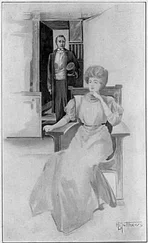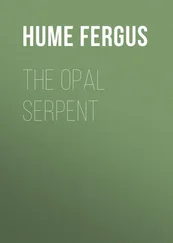Fergus Hume - The Red Window
Здесь есть возможность читать онлайн «Fergus Hume - The Red Window» — ознакомительный отрывок электронной книги совершенно бесплатно, а после прочтения отрывка купить полную версию. В некоторых случаях можно слушать аудио, скачать через торрент в формате fb2 и присутствует краткое содержание. ISBN: , Жанр: foreign_prose, на английском языке. Описание произведения, (предисловие) а так же отзывы посетителей доступны на портале библиотеки ЛибКат.
- Название:The Red Window
- Автор:
- Жанр:
- Год:неизвестен
- ISBN:http://www.gutenberg.org/ebooks/42056
- Рейтинг книги:5 / 5. Голосов: 1
-
Избранное:Добавить в избранное
- Отзывы:
-
Ваша оценка:
- 100
- 1
- 2
- 3
- 4
- 5
The Red Window: краткое содержание, описание и аннотация
Предлагаем к чтению аннотацию, описание, краткое содержание или предисловие (зависит от того, что написал сам автор книги «The Red Window»). Если вы не нашли необходимую информацию о книге — напишите в комментариях, мы постараемся отыскать её.
The Red Window — читать онлайн ознакомительный отрывок
Ниже представлен текст книги, разбитый по страницам. Система сохранения места последней прочитанной страницы, позволяет с удобством читать онлайн бесплатно книгу «The Red Window», без необходимости каждый раз заново искать на чём Вы остановились. Поставьте закладку, и сможете в любой момент перейти на страницу, на которой закончили чтение.
Интервал:
Закладка:
As usual, Sir Simon came to town with the least expense to himself, since it agonized him to spend a penny. But an old friend of his, more open-handed than the baronet, had lent him his town house. This was a small residence in a quiet Kensington square, by no means fashionable. The central gardens, surrounded by rusty iron railings, were devoid of flowers and filled with ragged elms and sycamores, suffered to grow amidst rank grass untrimmed and unattended. The roads around were green with weeds, and the houses appeared to be deserted. Indeed, many of them were, as few people cared to live in so dull a neighborhood; but others were occupied by elderly folk, who loved the quietness and retirement. Crimea square – its name hinted at its age – was a kind of backwater into which drifted human derelicts. A few yards away the main thoroughfare roared with life and pulsed with vitality, but the dwellers in the square lived as in the enchanted wood of the sleeping beauty.
No. 32 was the house occupied by Sir Simon, and it was distinguished from its neighbors by a coat of white paint. Its spurious, smart air was quite out of keeping with the neighborhood, and Sir Simon made ironical remarks when he saw its attempt at being up-to-date. But the house was small, and, although furnished in a gimcrack way, was good enough for a month's residence. Moreover, since he paid no rent, this enhanced its value in his avaricious eyes. It may be mentioned that the servants of the owner – a cook, a housemaid and a pageboy – had stopped on to oblige Sir Simon, and were ruled over by Mrs. Gilroy, much to their disgust. The housekeeper was by no means a pleasant mistress, and turned their intended holiday into a time of particularly hard work.
It was about the servants that Mrs. Gilroy spoke to her master one morning shortly after the occupation of the house. Sir Simon, accurately dressed as usual, and looking like a character out of Dickens as delineated by Phiz, was seated beside a comfortable fire supping a cup of plasmon cocoa, as containing the most nutriment in the least expensive form. While enjoying it, he mentally calculated various sums owing from various tenants about which he had come to see his lawyers.
The room was of no great size, on the ground floor, and had but two windows, which looked out on the dreary, untidy gardens. Like the exterior of the house, it had been newly painted and decorated, and was also furnished in a cheap way with chairs and tables, sofas and cabinets attractive to the uneducated eye, but detestable to anyone who could appreciate art. The scheme of color was garish, and, but that the blinds were pulled half-way down, so as to exclude too searching a light, would have jarred on Sir Simon's nerves. Lucy Randolph, who sat reading near the window, shuddered at the newness and veneer of her surroundings and thought regretfully of the lovely, mellow old Hall, where everything was in keeping and hallowed by antiquity. All the same, this too brilliantly-cheap room was cosy and comfortable, bright and cheery, and a pleasing contrast to the foggy, gray, damp weather. Perhaps it was this contrast which its decorator had desired to secure.
Mrs. Gilroy, with folded hands, stood at her master's elbow, a tall, thin, silent, demure woman with downcast eyes. Plainly dressed in black silk, somewhat worn, and with carefully-mended lace, she looked like a lady who had seen better days. Her hair, and eyes, and skin, and lips, were all of a drab color, by no means pleasing, and she moved with the stealthy step of a cat. Indeed, the servants openly expressed their opinion that she was one, and she certainly had a somewhat feline look. But, with all her softness and nun-like meekness, an occasional glance from her light eyes showed that she could scratch when necessary. No one knew who she was or where she came from, but she looked like a woman with a history. What that was only she and Sir Simon knew, and neither was communicative. Lucy Randolph hated her, and indeed no love was lost between the two. Mrs. Gilroy looked on Lucy as a pauper living on Sir Simon's charity, and Miss Randolph regarded the silent housekeeper as a spy. Each annoyed the other on every occasion in that skilful way known to the sex. But the war was carried on out of the old man's sight. That autocrat would speedily have put an end to it had they dared to skirmish in his presence.
"Well! well! well!" snapped Sir Simon, who talked something like George III. in reiterating his words. "What's the matter? What?"
"I have to complain of the housemaid Jane, sir."
"Then don't. I pay you to keep the servants quiet, not to bother me with their goings-on. Well! well! well!" somewhat inconsistently, "what's Jane been doing?"
"Receiving a follower – a soldier – one of those new young men who are going to the war."
"An Imperial Yeoman?" put in Miss Randolph, looking up with interest.
"Yes, Miss," responded Mrs. Gilroy, not looking round. "Cook tells me the young man comes nearly every evening, and makes love to Jane!"
"What! what!" said the baronet, setting down his cup irritably. "Tell the hussy to go at once. Love?" This in a tone of scorn. "As though I've not had enough worry over that with Bernard. Tell her to go."
Mrs. Gilroy shook her head. "We can't dismiss her, sir. She belongs to the house, and Mr. Jeffrey" —
"I'll see him about it later. If he knew he certainly would not allow such things. A soldier – eh – what? Turn him out, Gilroy, turn him out! Won't have it, won't have him! There! you can go."
"Will you be out to-day, sir?"
"Yes, I go to see my lawyers. Do you think I come to town to waste time, Gilroy? Go away."
But the housekeeper did not seem eager to go. She cast a look on Lucy eloquent of a desire to be alone with Sir Simon. That look Lucy took no notice of, although she understood it plainly. She suspected Mrs. Gilroy of hating Julius Beryl and of favoring Bernard. Consequently, all the influence of Mrs. Gilroy would be put forth to help the exiled heir. Lucy was fond of Bernard, but she was engaged to Julius, and, dragged both ways by liking and duty, she was forced to a great extent to remain neutral. But she did not intend to let Mrs. Gilroy have the honor and glory of bringing Bernard back to the Hall. Therefore she kept her seat by the window and her eyes on her book. Mrs. Gilroy tightened her thin lips and accepted defeat, for the moment. A ring at the door gave her an excuse to go.
"It's Julius," said Lucy, peeping out.
"What does he want?" asked Sir Simon, crossly. "Tell him to wait, Gilroy. I can't see him at once. Lucy, stop here, I want to speak."
The housekeeper left the room to detain Mr. Beryl, and Lucy obediently resumed her seat. She was a handsome, dark girl, with rather a high color and a temper to match. But she knew when she was well off and kept her temper in check for fear of Sir Simon turning her adrift. He would have done so without scruple had it suited him. Lucy was therefore astute and assumed a meekness she was far from possessing. Mrs. Gilroy saw through her, but Lucy – as the saying goes – pulled the wool over the old man's eyes.
Sir Simon took a turn up and down the room. "What about Bernard?" he asked, abruptly stopping before her.
Lucy looked up with an innocent smile. "Dear Bernard!" she said.
"Do you know where he is?" asked the baronet, taking no notice of the sweet smile and sweet speech.
"No, he has not written to me."
"But he has to that girl. You know her?"
"Alice! yes, but Alice doesn't like me. She refuses to speak to me about Bernard. You see," said Lucy, pensively, "I am engaged to Julius, and as you have sent Bernard away – "
"Julius comes in for my money, is that it?"
"Not in my opinion," said Miss Randolph, frankly, "but Alice Malleson thinks so."
"Then she thinks rightly." Lucy started at this and colored with surprise at the outspoken speech. "Since Bernard has behaved so badly, Julius shall be my heir. The one can have the title, the other the money. All the same I don't want Bernard to starve. I daresay Julius knows where he is, Lucy. Find out, and then I can send the boy something to go on with."
Читать дальшеИнтервал:
Закладка:
Похожие книги на «The Red Window»
Представляем Вашему вниманию похожие книги на «The Red Window» списком для выбора. Мы отобрали схожую по названию и смыслу литературу в надежде предоставить читателям больше вариантов отыскать новые, интересные, ещё непрочитанные произведения.
Обсуждение, отзывы о книге «The Red Window» и просто собственные мнения читателей. Оставьте ваши комментарии, напишите, что Вы думаете о произведении, его смысле или главных героях. Укажите что конкретно понравилось, а что нет, и почему Вы так считаете.












